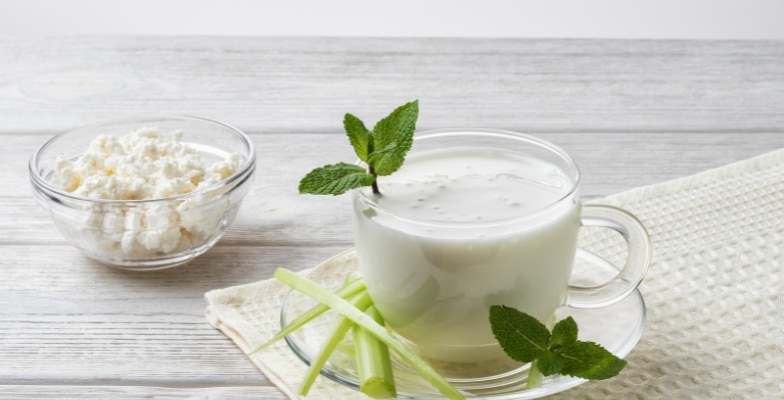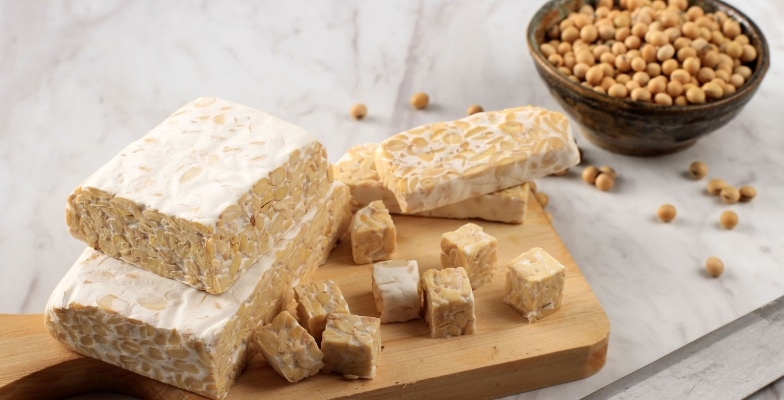Kefir For Gut Health
- Introduction
- Why Kefir Is Good For You
- What Do Probiotic Drinks Do?
- Kefir Vs. Yogurt
- How Much Kefir Should I Drink?

Introduction
Kefir is not a new dairy product. It originated thousands of years ago in the Caucasus mountains and has been a part of Eastern European culture. The word kefir comes from the Turkish word ‘keyif,’ which means ‘feeling good.’
It’s traditionally made by adding bacteria and yeast cultures to milk in symbiotic association with kefir grains. The cultures feed on natural sugars in the milk, multiply and result in a fermented drink.
The main products of kefir fermentation are lactic acid, ethanol and CO2, providing a distinct, tangy, and acidic flavor. It’s been produced using milk from cows, ewes, goats, and buffalo and has been sold under various names, including kephir, kiaphur, kefyr, képhir, kéfer, knapon, kepi, and kippe.
The nutritional composition of kefir varies widely and depends on milk composition, the origin and composition of the kefir grains used, and the time and temperature of fermentation and storage conditions. 1https://books.google.co.in/books?hl=en&lr=&id=nn2-lqEXdqcC&oi=fnd&pg=PA1&ots=rkad2vfjvX&sig=Teabkw_x3opExFZM_1KgSGbCh8M&redir_esc=y#v=onepage&q&f=false
Kefir is considered a superfood as it is high in nutrients and probiotics, it benefits digestion and is good food for gut health. Here are a few reasons why kefir is good for you.
Related Article: Superfoods Definition: Top Superfood List And Benefits
Why Kefir Is Good For You
Kefir became very popular due to its unique properties and beneficial effects on human health. The health effects caused by kefir and kefir products may be attributed to several components, such as lactic acid bacteria, yeasts, organic acids, antioxidants, and bioactive peptides. 2https://pubmed.ncbi.nlm.nih.gov/25542841/, 3https://pubmed.ncbi.nlm.nih.gov/23824665/
It is an inherently high nutritional value source of protein and calcium with high digestibility. However, one cup (240ml) of plain kefir may provide the following: 4https://fdc.nal.usda.gov/fdc-app.html#/food-details/432442/nutrients
Calories: 168
Protein: 10g
Carbs: 11g
Sugar: 11.2g
Calcium: 410mg ( 30% of DV)
Vitamin A: 250IU (6% of DV)
Kefir is also a good source of vitamins B1, B2, B3, B5, K and A. Among minerals, kefir is an excellent magnesium, potassium and calcium source. In addition, the fermentation process increases its content of riboflavin, folic acid, biotin and thiamine.
Kefir also has a reputation as a beverage with associated health benefits, and historically it has been used to treat gastrointestinal problems, hypertension, allergy, and ischemic heart disease.
Antibacterial Properties
Kefir shows antibacterial properties against several harmful microorganisms. Studies indicate that kefir antimicrobial activity is associated with producing organic acids, peptides (bacteriocins), carbon dioxide, hydrogen peroxide, ethanol and diacetyl.
These compounds may have beneficial effects in reducing food-borne pathogens and deteriorating bacteria during beverage production and storage and treating and preventing gastroenteritis and vaginal infections. 5https://pubmed.ncbi.nlm.nih.gov/15848295/ , 6https://www.ncbi.nlm.nih.gov/pmc/articles/PMC3833126/
Studies have indicated the potential application of kefir and its components in preventing and treating infectious enteric bacteria. 7https://www.sciencedirect.com/science/article/abs/pii/S0958694621000492, 8https://www.sciencedirect.com/science/article/abs/pii/S0924857905000543#preview-section-references But again, we are not suggesting using probiotics or kefir as a substitute for medical treatment for an existing infection. If you have any medical issues, please get in touch with your healthcare professional.
Protect Against Cancer
The probiotics in fermented dairy products are believed to reduce tumor growth by stimulating the immune system. Furthermore, bioactive compounds, like proteins and polysaccharides, can directly act on cancer cells in kefir.
They can disrupt the cell cycle and the growth of cancer cells. By doing so, they activate apoptosis, or the cell-death mechanism, in cancer cells. Studies have suggested that kefir may have promising results against cancer. 9https://pubmed.ncbi.nlm.nih.gov/27144297/, 10https://pubmed.ncbi.nlm.nih.gov/25189203/, 11https://pubmed.ncbi.nlm.nih.gov/21448298/, 12https://www.sciencedirect.com/science/article/pii/S0022030207716788, 13https://pubmed.ncbi.nlm.nih.gov/17887934/
It May Help In Lactose Digestion
Kefir may also be able to help with lactose intolerance, a common digestive issue that can lead to symptoms such as excess gas and bloating. Lactose intolerance is caused by lactose malabsorption, a condition in which the small intestine makes low lactase levels and can’t digest all the lactase one consumes.
It’s usually due to an insufficient enzyme called beta-galactosidase, which helps break lactose down. However, beta-galactosidase is naturally present in kefir grains, so during fermentation, it reduces the amount of lactose in the milk by around 30%. 14https://www.sciencedirect.com/science/article/abs/pii/S0002822303002074, 15https://pubmed.ncbi.nlm.nih.gov/12728216/, 16https://www.researchgate.net/publication/10777259_Kefir_improves_lactose_digestion_and_tolerance_in_adults_with_lactose_maldigestion
Kefir is a beverage consumed due to its attributed probiotic health benefits; therefore, it’s essential to understand what probiotic drinks do to our health.
What Do Probiotic Drinks Do?
Probiotics are healthy bacteria found in certain foods that aid in digestion. In addition, our gut has a specific bacteria microbiome that keeps it healthy. The most common are bacteria that belong to groups called Lactobacillus and Bifidobacterium. 17https://www.nccih.nih.gov/health/probiotics-what-you-need-to-know
Consumption of junk, processed foods and lifestyle habits can disrupt the microbiome and cause bloating, indigestion, acid reflux and flatulence. Probiotics help break down food, synthesize vitamins, prevent bacteria that cause illness from getting a foothold, and may even strengthen immunity.
Adding probiotic drinks to your daily routine will greatly benefit you in the long run. They help regulate your gut bacteria, but they also come with a multitude of other benefits.
Many studies have uncovered the benefits of probiotics and fermented foods. For example, a study done by Stanford researchers discovered that a 10-week diet high in fermented foods boosts microbiome diversity and improves immune responses. 18 https://med.stanford.edu/news/all-news/2021/07/fermented-food-diet-increases-microbiome-diversity-lowers-inflammation
While taking probiotic drinks, make sure the label mentions the strains of probiotics it contains and the CFUs (colony-forming units) to know how many probiotics you are getting. Also, always check that the label says live active bacteria or yeast cultures.
Related Article: Probiotics For Gut Health | 9 Probiotics-Rich Foods
A few of our readers may need clarification about which one to prefer or, instead, yogurt Vs. kefir, who would win the battle.
Kefir Vs. Yogurt
As far as total health is concerned, both are winners. Kefir is often compared to yogurt, and the two products are similar in some ways. Like Greek yogurt, kefir has a slightly sour flavor and is created through fermentation. In addition, kefir’s nutrition is similar to yogurt’s, supplying protein and calcium.
However, kefir has a thinner consistency than yogurt and Greek yogurt. The difference would be that other fermented dairy products are made from fewer strains and contain no yeasts.
Instead, kefir benefits from a vast and diverse composition of around 30 unique beneficial probiotic bacteria and yeast that are known to improve gut health and may aid the body’s digestive processes.
These microbes produce bioactive compounds that have numerous benefits for our health, from improving digestion and weight management to lowering cholesterol levels and mental health. One study found that kefir extract reduced the number of human breast cancer cells by 56%, compared with only 14% for yogurt extract. 19https://pubmed.ncbi.nlm.nih.gov/17887934/
How Much Kefir Should I Drink?
Now that is an exciting and essential question. Although there is no one-size-fits-all answer, 1-2 cups (200-500 ml) daily should be good enough, but people with weak immune systems should avoid consuming kefir or ask their physician first.
And it would be sensible to start with a small amount and increase slowly. It would be great to make it at home. Otherwise, try to buy an organic and good quality one.
The bottom line is that probiotics, fermented gut healthy foods, dairy-based drinks and foods like yogurt, kefir, kombucha tea etc., should be included as functional food to provide microbial diversity benefits beyond their nutritional value.

Skill-Based Education.
Global Recognition.
Powerful Community Building
Secure a certificate of completion in as little as a day by graduating from one of our free courses.
Get Access to Our Free Courses. No Credit Card Required.

Fabulous Body Membership
Your All-Access Pass to A Fabulous Body & A Rewarding Career
25+ Certificate Courses & Programs, All Included
15 Day Free Trial, 100% Money-Back Guarantee
About Team Fabulous Body
Team Fabulous Body is a group of individuals working as a part of Fabulous Body working to bring you great content that includes practical knowledge with well researched studies.










